On the occasion of Lunar New Year, tourists visit temples and pagodas, don't forget to prevent epidemics
(Baonghean.vn) - This year, due to the impact of the pandemic, temples and pagodas will only organize the ceremony and not the festival. Regarding the management of temple and pagoda visits at the beginning of the year, Nghe An Newspaper had an interview with Mr. Bui Cong Vinh - Deputy Director of the Department of Culture and Sports.
Reporter: Sir, festival organization has always received much attention from the people and managers. So, in the face of the complicated epidemic situation, we still carry out new normal activities. What are the industry's instructions for festival activities in 2022?
Mr. Bui Cong Vinh:That's right,traditional festivalsFestivals are long-standing cultural activities, closely associated with people's daily lives and always receive people's attention, especially at the beginning of the New Year. The synthesis, multifaceted, and diverse nature of the activities contained in the festival processes is called by cultural researchers the synthesis of folk culture and Vietnamese national culture. That is because every festival contains within it the sacredness associated with the entrustment of many wishes that people wish for a year of favorable weather, favorable wind, and good business. The sacredness of festivals becomes an important nucleus that unites the community into a unified block with the same aspirations. Therefore, going to temples, pagodas, or participating in festivals at the beginning of the year has become a spiritual food as well as a long-standing cultural feature of the Vietnamese people.
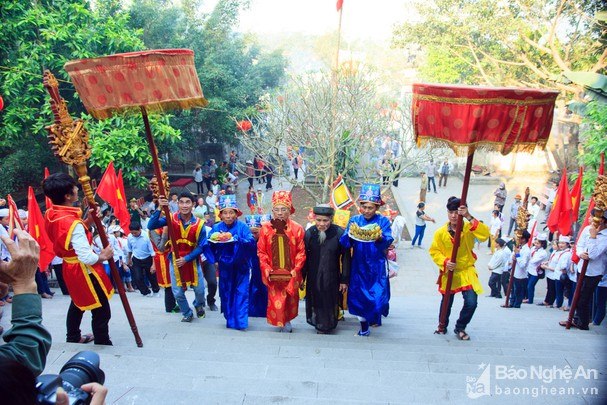 |
| The Cuong Temple Festival attracts thousands of visitors, but this year due to the epidemic, the festival will not be held, and the ceremony is expected to take place solemnly to ensure epidemic prevention and control. Photo: Nguyen Book's documents |
Nghe An is a locality with a large number of cultural and spiritual relics such as temples, pagodas and shrines, associated with relatively diverse customs and spiritual beliefs. We have up to 29 festivals, of which 20 take place in the spring (from January to March of the lunar calendar), the rest take place at other times of the year. The opening is the Pan Pang - Nang Ny Festival (Chau Cuong commune, Quy Hop district), held on the 5th and 6th of the first lunar month); the ending is the Ong Hoang Muoi Temple Festival (Hung Thinh commune, Hung Nguyen district) taking place on the 9th and 10th of the 10th lunar month. In recent times, the Department of Culture and Sports has always paid attention to preserving and promoting the good traditional values of the festival.
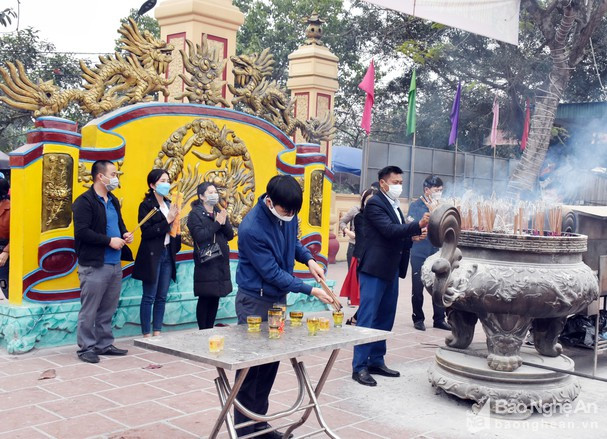 |
| Temples and pagodas in the province strictly implement epidemic prevention and control work, especially at the end of the year. Photo: Documentary |
This is the third year we have had to fight the pandemic and the province's cultural activities in general, and traditional festivals in particular, have been affected. Many festivals have had to be temporarily suspended to prioritize epidemic prevention and control. In 2022, to respond to the pandemic in the new situation, the Department of Culture and Sports will advise the Provincial People's Committee and try to direct and coordinate with localities in organizing festivals so that people can still participate in the festival while still ensuring effective epidemic prevention and control rules.
PV: Speaking of the original values of the festivals that we are promoting and preserving, what do you say about organizing the rituals at traditional festivals in the Spring?
Mr. Bui Cong Vinh:Most of the festivals are guided and strictly managed by us in terms of organization, so the rituals are performed properly. The rituals in traditional festivals usually include the Announcement, the Great Sacrifice, the Thanksgiving Ceremony and the Procession. Currently, the rituals in festivals have been guided based on the script files that have been preserved from ancient times, from which new scripts have been developed, especially in the Great Ceremony or the Procession Ceremony to suit the actual conditions.
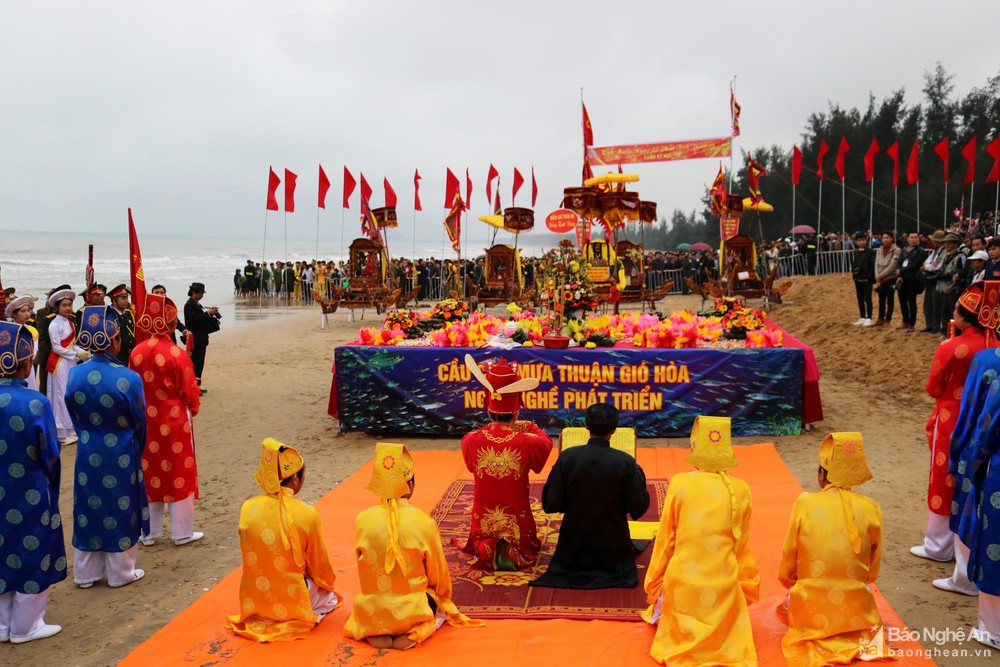 |
| Ritual in the Vomit Running tradition at Con Temple Festival. Photo courtesy |
Usually, a typical festival in a region has its own characteristics. For example, in the river region, there is the Hen Procession Festival at Thanh Liet Temple in Hung Lam Commune, Hung Nguyen District, which takes place on Lam River, with the detail that the celebrant is the oldest person in the village performing the traditional ritual to worship the gods, and in that sacred moment, the participants witness the unique and sacred features of this ritual.
Or for the Announcement Ceremonies of the Qua Temple, Con Temple, or Bach Ma Temple, there are many similar details because they are in the same region and have relatively similar worship regimes.
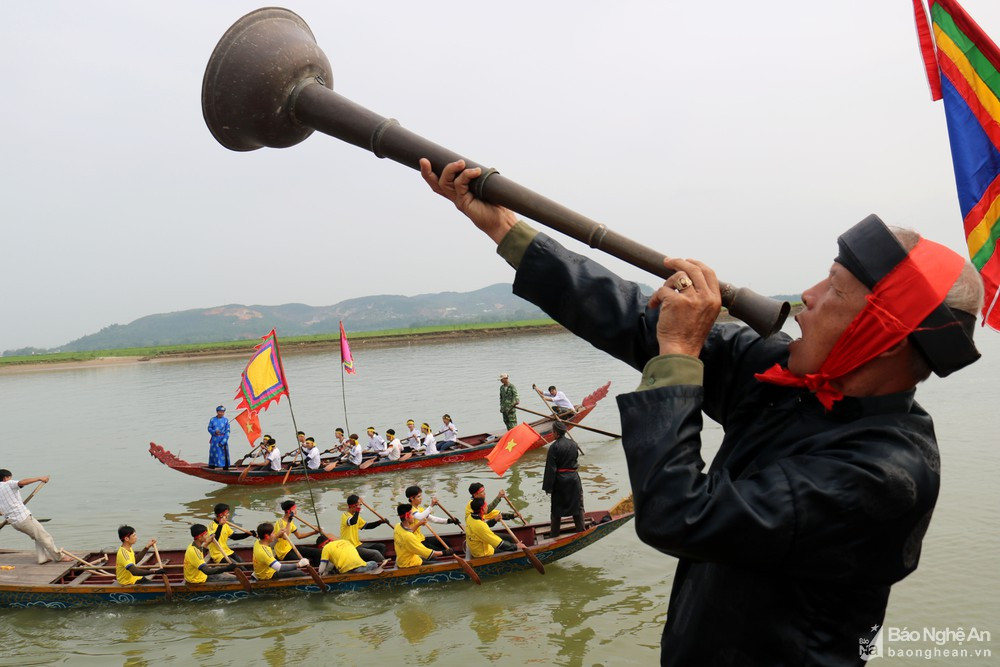 |
| Unique fishing festival on Lam River at Thanh Liet Temple Festival. Photo: Huy Thu |
One thing I want to say is that in many details of a festival we need to understand that in the festival there is a festival and in the festival there is a ceremony. For example, the Vomit Running custom in the Con Temple Festival is often performed in the festival part, but its rituals and forms are also considered activities of a part of the ceremony. Or the mussel procession ritual in the Thanh Liet Temple Festival, which has just been recognized as a National Intangible Cultural Heritage, is also considered a unique feature, the identity of the Lam River region where people cling to the riverbank with bamboo poles and mussels to make a living. And the ceremony here is also responded to by the people like the festival part of this festival.
PV: The folklore of Nghe An still says “First Con, second Qua, third Bach Ma, fourth Chieu Trung”, these are temples that have long been famous for their sacredness and are the destination of many pilgrims at the beginning of the year to pray for peace, luck and fortune. So, sir, surely people come here because of some special feature in the practice of worship rituals to pray for themselves and their families a new year of wealth and fortune?
Mr. Bui Cong Vinh:As we know, every temple contains its own sacred qualities, which have been summarized over hundreds of years, and are also an indispensable religious activity of the people, when they go to pagodas and temples on the first day of the new year to pray for luck, happiness, favorable weather, favorable weather and favorable terrain.
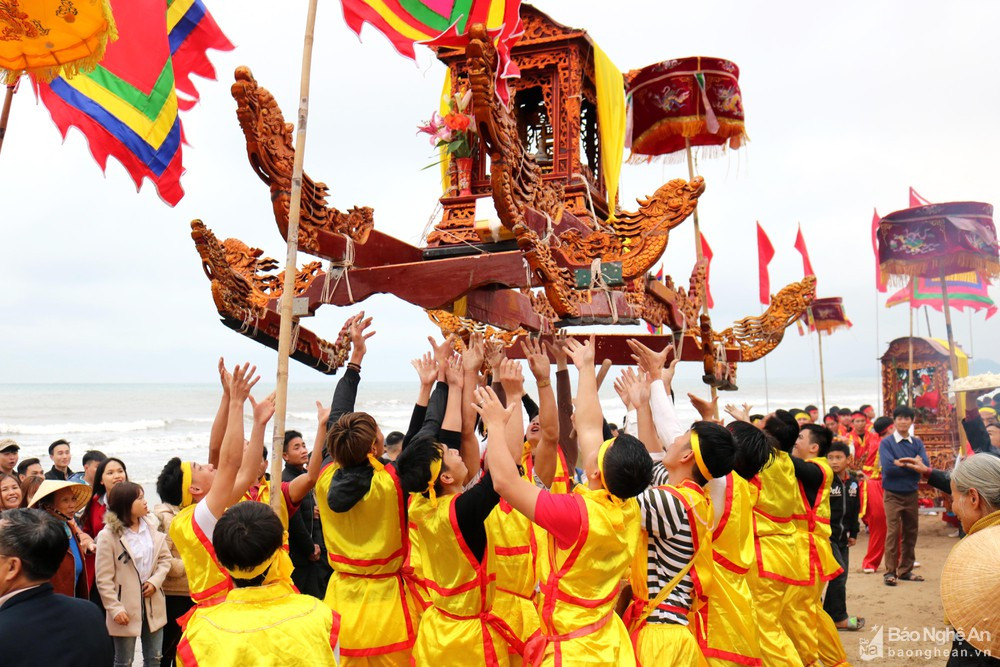 |
| The Vomit Running Custom in the Con Temple Festival is a unique feature that needs to be preserved, maintained and promoted. Photo courtesy of Huy Thu |
And of course, among those rituals, the ritual of shaking bamboo sticks and cards at the beginning of the year in some temples and pagodas is the most accessible to the people. For them, it is the "lucky fortune" at the beginning of the year. Therefore, the management board of temples and pagodas still considers that practice a unique feature of temples and pagodas and they publicly announce the results of the card reading right into the corresponding numbers, which is very easy to understand.
Moreover, in addition to casting lots or burning incense to make offerings at the beginning of the year, visitors from all over the world also come to pagodas and temples to worship and enjoy the scenery, which is the way people visit and sightsee at the beginning of the new year. And spiritual tourism is being promoted to attract visitors in the coming time.
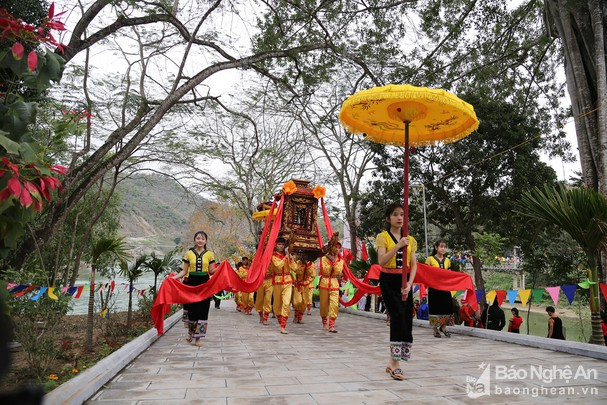 |
| Procession at Van Cua Rao Temple Festival. Photo: Sach Nguyen |
The Department of Culture has focused on directing, restoring, maintaining and promoting the historical and cultural values and cultural beauty of traditional festivals. As mentioned above, Nghe An currently has 29 festivals included in the management list, in compliance with the regulations on civilized lifestyle according to Decree No. 110/2018/ND-CP dated August 29, 2018 of the Government. There are 7 festival heritages recognized by the Ministry of Culture, Sports and Tourism as National Intangible Cultural Heritage, including: Chin Gian Temple Festival, Con Temple Festival, Thanh Liet Temple Festival, Qua Son Temple Festival, Xang Khan Ritual, Ong Hoang Muoi Temple Festival and Bach Ma Temple Festival.
Therefore, to ensure epidemic prevention and control while still ensuring conditions for people to practice their beliefs, we have instructed the management boards of temples and pagodas to arrange entrances and exits at the gates, and require people entering and leaving temples and pagodas to strictly follow the "5K" recommendations prescribed by the Ministry of Health. In the temple and pagoda grounds, there should not be too many people gathering at the same time to avoid Covid-19 infection.
PV: Through monitoring, in recent years regarding the management of festival organization, we have noticed some limitations, such as the business of goods and services is still chaotic, following customers, begging, taking advantage of festivals for superstitious activities, and the service of parking vehicles at relics in some festivals has not been properly planned. Besides, the custom of burning votive paper still occurs, causing waste, pollution, and loss of aesthetics. In your opinion, in the new conditions, what should management levels do to ensure the solemnity of temple activities at the beginning of the new year?
Mr. Bui Cong Vinh:We have grasped all of these and have many ways of managing, gradually bringing the organization of religious practices in temples and pagodas into order, both solemn and economical. Therefore, although this year, we have reduced the number of visitors and strictly managed the implementation of the "5K" recommendations, at the same time, we have also increased propaganda, mobilization, and regular reminders to raise awareness and responsibility of all levels, sectors, people and tourists to seriously implement the State's regulations on civilized lifestyle in festivals, epidemic prevention and control at relics and festivals. Propaganda and introduction of the origin of festivals, relics, the values, and true meanings of traditional beliefs and rituals; the rights and responsibilities of festival participants and activities at relics.
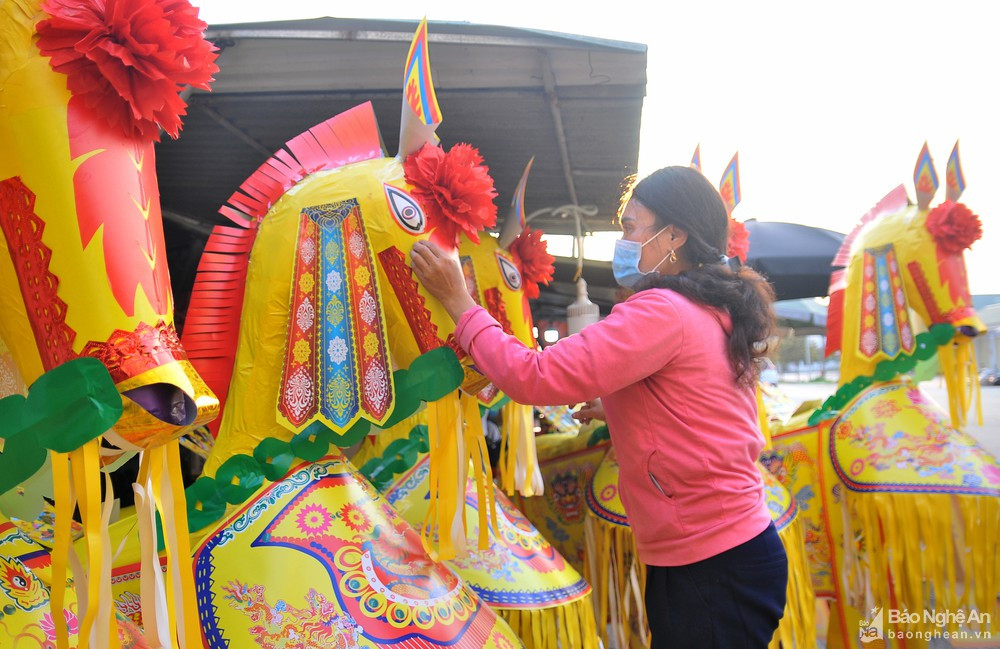 |
| Every year, at some temples and pagodas in the province, the burning of votive paper still occurs, causing waste and environmental pollution. Photo: document |
Do not let the organization of offering stars to dispel bad luck turn into profiteering services, encourage people to limit the burning of votive paper and gold, ensure safety, save money, and not show off. Organize plans for traffic order and safety, fire prevention and fighting, security, order, and food safety and hygiene.
The Chairman of the Provincial People's Committee has just signed and issued Directive 01/CT-UBND on strengthening measures to ensure the celebration of the Lunar New Year 2022, which clearly states the suspension of all types of festivals and fireworks displays during Tet. The Department of Culture and Sports and the Department of Tourism coordinate with departments, branches and localities to strengthen inspection and supervision of the implementation of regulations and requirements on Covid-19 prevention and control for cultural activities and festivals in the province according to documents and instructions from the Central Government. Therefore, although temples and pagodas are still open at the beginning of the new year, and rituals in Spring festivals are still performed, we must strictly implement epidemic prevention and control work, and not gather in large crowds, especially in the context of the epidemic still being complicated.
PV: Thank you for this conversation!

